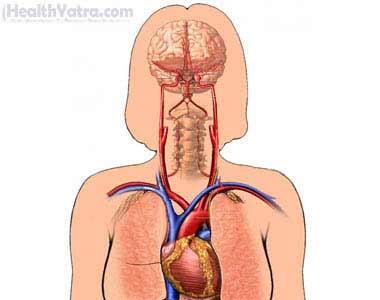تعريف
Fainting is a loss of consciousness that happens quickly and sometimes without warning. A fainting episode usually resolves within seconds to minutes. If fainting is caused by another condition, then the condition will need to be treated.
أسباب
In general, fainting is caused by decreased blood flow to the brain.

Decreased blood flow to the brain can be caused by:
Most commonly, vasovagal spells. Vasovagal spells can occur:
- During medical procedures
- During times of high stress, trauma, or fright
- After standing still for a long period of time
حالات طبيه:
- Orthostatic hypotension, low blood pressure when standing
- تجفيف
- فقر دم
- Hypoglycemia, which is low blood sugar
- اِنتِزاع
- Stroke or transient ischemic attack
- إيقاعات القلب غير طبيعية
- Heart conditions
- Blood loss
Fainting can also occur as a side effect to medications. These include:
- Blood pressure medications
- Medications to regulate heart rhythms
- Diuretics
- Certain antidepressants
عوامل الخطر
Factors that increase your risk of fainting include having a history of fainting.
الأعراض
قد تشمل الأعراض ما يلي:
- فقدان مفاجئ للوعي
- Inability to remain standing or sitting
- Consciousness regained without any need for intervention
- Dizziness or lightheadedness before losing consciousness
متى يجب أن أتصل بطبيبي؟
Call your doctor if you are having episodes of fainting. This is especially important if you:
- Have a heart condition
- Have a job where you or others may be at risk if you faint. Examples include airline pilot, bus driver,or machinist.
متى يجب علي طلب المساعدة الطبية على الفور؟
اتصل للحصول على المساعدة الطبية أو اذهب إلى غرفة الطوارئ على الفور إذا كان لديك:
- Weakness or numbness of face, arm, or leg, especially on the left side of the body
- ارتباك
- Loss of balance, coordination problems
- مشاكل في الرؤية
- صداع حاد
- Rapid, irregular heartbeat; chest pain
التشخيص
الطبيب سوف يسأل عن الأعراض والتاريخ الطبي. الفحص السريري سيتم القيام به.
قد تشمل الاختبارات ما يلي:
- تحاليل الدم
- مخطط كهربية القلب (EKG)
- Holter monitoring
- الاشعة المقطعية
- Electroencephalogram (EEG)
- التصوير بالرنين المغناطيسي
- مخطط صدى القلب
- Tilt table testing
- MR angiogram and CT angiogram
العلاج
Treatment will depend on the underlying condition that has caused fainting. This may include medications, lifestyle changes, or surgery.
If you are diagnosed as having fainted, follow your doctor’s instructions.
الوقاية
If you are prone to fainting:
- Know the warning signs. If you feel that you are going to faint, sit or lie down right away.
- Get up slowly and carefully from lying down. Start by sitting up for a minute and then stand up.
- شرب الكثير من السوائل.
- Discuss dietary changes with your doctor.
- Avoid using alcohol or other drugs.
There are certain physical maneuvers that rapidly raise blood pressure and blood flow to the brain. They are called physical counterpressure maneuvers. When these are done during warning signs, you may be able to prevent fainting. Examples include:
- Crossing your legs while tensing the muscles of legs, abdomen, and buttocks.
- Forcefully squeezing a rubber ball or other object as hard as possible. Try to use your dominant hand.
- Gripping one hand with the other while tensing both arms and raising the elbows slightly.
